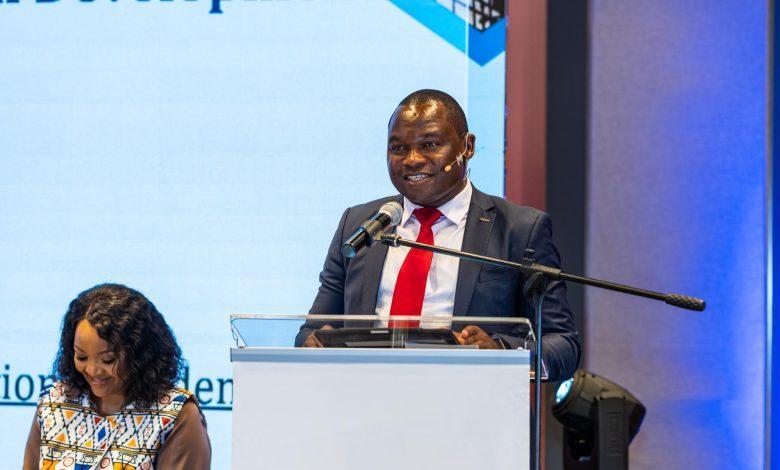Africa-Press – Eritrea. Amid ongoing efforts to reposition African economies for inclusive recovery and long-term growth, Dr Tinashe Manzungu, President of the Zimbabwe Building Contractors Association (ZBCA), has issued a strong call for urgent and coordinated infrastructure development across the continent.
Addressing delegates at the Master Builders Annual Congress, Dr Manzungu a renowned infrastructure development specialist and CEO of Zimbabwe-based Zim Build highlighted infrastructure as the foundation for Africa’s economic transformation.
A seasoned regional expert and COMESA Board Member, Dr Manzungu stressed that accelerating infrastructure development is not just a policy goal, but a time-sensitive imperative.
He pointed to South Africa’s progress in roads and transport networks as a model but urged the continent to go further by enhancing cross-border connectivity that supports both physical and economic integration.
Delays in infrastructure delivery, he warned, are no longer a matter of planning timelines — they are costing Africa valuable time and opportunity.
Infrastructure Deficits Threaten Economic Stability
Dr Manzungu painted a sobering picture of the continent’s infrastructure reality. While Africa’s population reached over 1.5 billion in 2022, access to basic services remains alarmingly low with only 31 percent of Sub-Saharan Africans having electricity and 48 percent accessing safe drinking water. According to his analysis, Africa requires at least R150 billion annually to close this infrastructure gap, yet the majority of projects fail to move beyond feasibility studies.
An estimated 80 percent of planned initiatives stall early, and up to 90 percent collapse before completion.
He attributed this high failure rate not merely to a lack of funds, but to a shortage of skilled professionals particularly engineers. “We’re not just lacking financing; we’re lacking the capacity to deliver,” he noted. Without sufficient human capital to design and implement projects, even well-funded ventures are bound to fail.
Engineering Shortage: A Structural Barrier
One of the most pressing challenges highlighted by Dr Manzungu was the shortage of engineers across Africa, which he described as a “silent crisis.”
He compared Africa’s situation with other regions: Europe has one engineer per 200 people, while South Africa has one per 3,100, and Zimbabwe just one per 3,400. To meet the infrastructure demands of Agenda 2063, the continent would need to train and deploy an additional 2.4 million engineers.
He urged governments and development institutions to go beyond scholarships by investing in mentorship programmes, apprenticeships, and local skills development to create a sustainable engineering pipeline. Building capacity, he argued, is just as critical as building infrastructure.
Why Infrastructure Is the Economic Game-Changer
Underdeveloped infrastructure, Dr Manzungu explained, is costing African economies dearly. Studies indicate that poor infrastructure is shaving off up to 2 percent of GDP annually, and industrial productivity has dropped by as much as 40 percent due to unreliable power, inadequate roads, and inefficient logistics systems.
Transport costs in Africa are between 50 percent and 175 percent higher than global averages, making trade prohibitively expensive. Intra-African trade sits at just 15 percent, compared to 60 percent in Asia and 70 percent in Europe a stark figure that threatens the success of the African Continental Free Trade Area (AfCFTA).
Without seamless infrastructure, Dr Manzungu argued, Africa’s ambitions for free trade and economic integration will remain theoretical. “Tariffs and treaties alone won’t build the roads or move the goods,” he emphasized.
Solutions: Partnerships and Regional Integration
Despite the daunting challenges, Dr Manzungu outlined a path forward, beginning with Public-Private Partnerships (PPPs) and innovative financing models. He cited the Beitbridge Border Post upgrade in Zimbabwe as an example of how private sector participation can fast-track infrastructure delivery.
He also encouraged greater adoption of blended finance, user-pay systems, and land value capture to create sustainable revenue streams. However, he emphasized that beyond finance, projects must be bankable with robust planning, sound regulatory frameworks, and realistic return models.
Dr. Manzungu commended the Programme for Infrastructure Development in Africa (PIDA) for providing a strategic blueprint for regional cooperation, and pointed to the Kazungula Bridge linking Botswana, Zambia, Zimbabwe, and Namibia — as a successful case of integrated regional infrastructure.
“No single African country can go it alone,” he said. “Our infrastructure plans must transcend borders and focus on regional corridors.”
Turning an Infrastructure Gap into an Economic Opportunity
While acknowledging the scale of the challenge, Dr Manzungu struck a note of optimism. Africa’s youthful population, natural resource wealth, and emerging consumer markets present a unique opportunity if the infrastructure is put in place to unlock them.
He called on governments to stop exporting raw materials and instead focus on building local value chains, using resources like lithium and cobalt to drive industrialisation and green technologies. With the right infrastructure, Africa could become a global manufacturing hub, not just a source of raw exports.
“We’re exporting our future one shipment at a time,” he cautioned. “Let’s keep that value here.”
Final Call: Building Africa’s Future, Together
Dr Manzungu closed his keynote with a rallying call to treat infrastructure development as a continental priority, not a sectoral issue.
He urged all stakeholders to collaborate governments, private sector, academia, and civil society to build a solid foundation for Africa’s rise.
“Africa cannot ascend on weak foundations. Let’s build the roads, power the cities, train the engineers, and create opportunity,” he concluded. “Infrastructure is not just steel and cement it’s economic liberation.”
His address earned a standing ovation from delegates, many of whom praised his depth of insight and unwavering vision for Africa’s development.
The Master Builders Annual Congress is a premier event for infrastructure, engineering, and construction leaders in Africa. It brings together industry professionals, policymakers, investors, and thought leaders to exchange ideas and explore solutions for the continent’s most pressing infrastructure challenges.
This year’s event was held at Sun City Resort, South Africa, under the theme: “Turning South Africa into a Construction Site: Collaborative Commitment to Accelerate Infrastructure Development and Investment.” It attracted a high-level audience including ministers, CEOs, engineers, and regional development partners.
Source: Daily News – Tanzania Standard Newspapers
For More News And Analysis About Eritrea Follow Africa-Press







